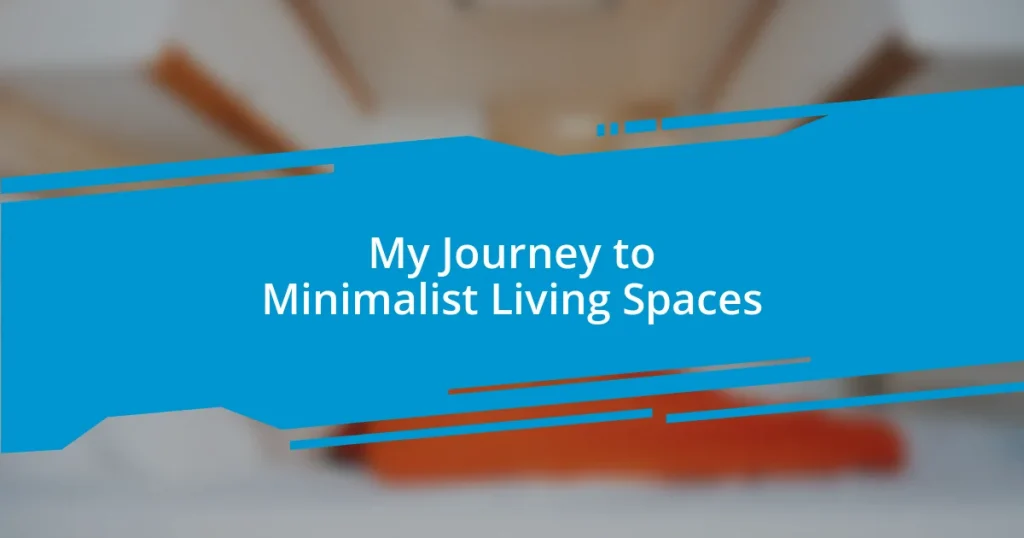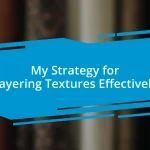Key takeaways:
- Minimalist living emphasizes intentionality, focusing on quality over quantity and fostering emotional clarity through decluttering.
- Adopting a minimalist mindset reduces stress, increases focus, and promotes financial freedom by prioritizing experiences over material possessions.
- Maintaining a minimalist home involves habits like the “one in, one out” rule and regular assessments to ensure a space that reflects personal values and intentional living.
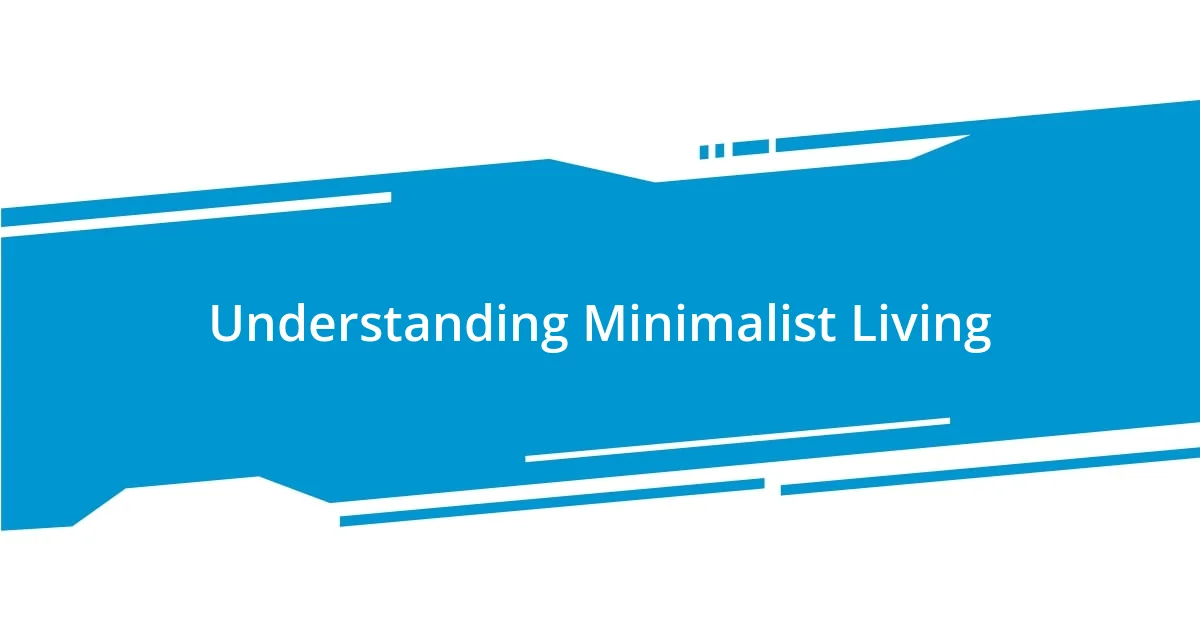
Understanding Minimalist Living
Minimalist living is more than just a trend; it’s a mindset that encourages us to focus on what truly matters. I remember the moment I realized I was drowning in clutter, both physically and mentally. Have you ever felt that overwhelming sensation when you walk into a room filled with too much stuff? It pushed me to see minimalism not as deprivation but as a pathway to freedom.
Diving deeper into this lifestyle, I learned that minimalism is about intentionality—choosing quality over quantity. For instance, when I swapped my heavy furniture for lighter, multifunctional pieces, my space felt like it could breathe. Have you ever thought about how our environments affect our mood? It’s astonishing how clarity can emerge from simplicity.
Ultimately, minimalist living is a personal journey that evolves over time. As I let go of items that no longer served me, I not only cleared my space but also felt a weight lifted off my shoulders. What aspects of your life could benefit from a little decluttering? The answers might surprise you!
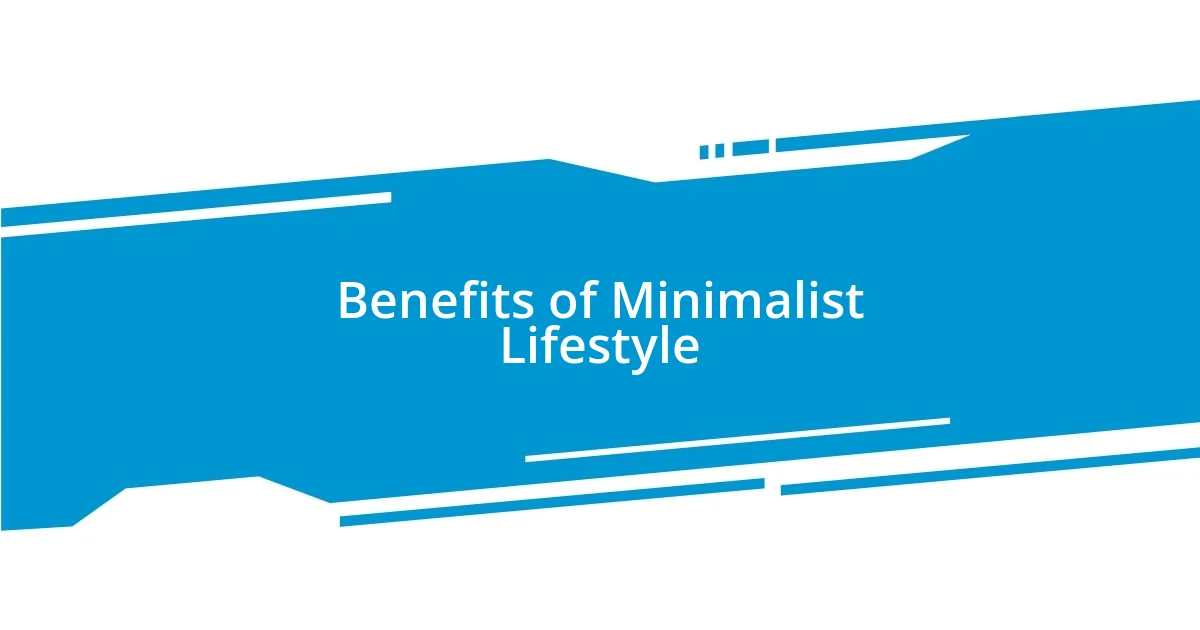
Benefits of Minimalist Lifestyle
The benefits of embracing a minimalist lifestyle are profound and transformative. When I first cleared out my closet, I was astounded by how many clothes I owned that I never wore. It wasn’t just about the physical space—I found a sense of peace in having fewer choices. Simplifying my surroundings allowed me to focus on what truly matters, leading to less anxiety and a stronger sense of purpose in my day-to-day life.
Here are some compelling benefits of minimalism:
- Reduced Stress: A clutter-free environment promotes a serene and stress-free atmosphere.
- Increased Focus: With fewer distractions, I found it easier to concentrate on tasks that require my attention.
- Financial Freedom: I realized how much I was spending on unnecessary items, and now I prioritize experiences over possessions.
- Time Savings: Less clutter means less time spent cleaning and organizing, freeing up hours for activities I love.
- Emotional Purification: Letting go of items laden with memories helped me process my emotions, making room for new experiences.
Every piece I removed from my life not only lightened my space but also unburdened my mind. Isn’t it fascinating how the physical act of decluttering can lead to a deeper emotional clarity?
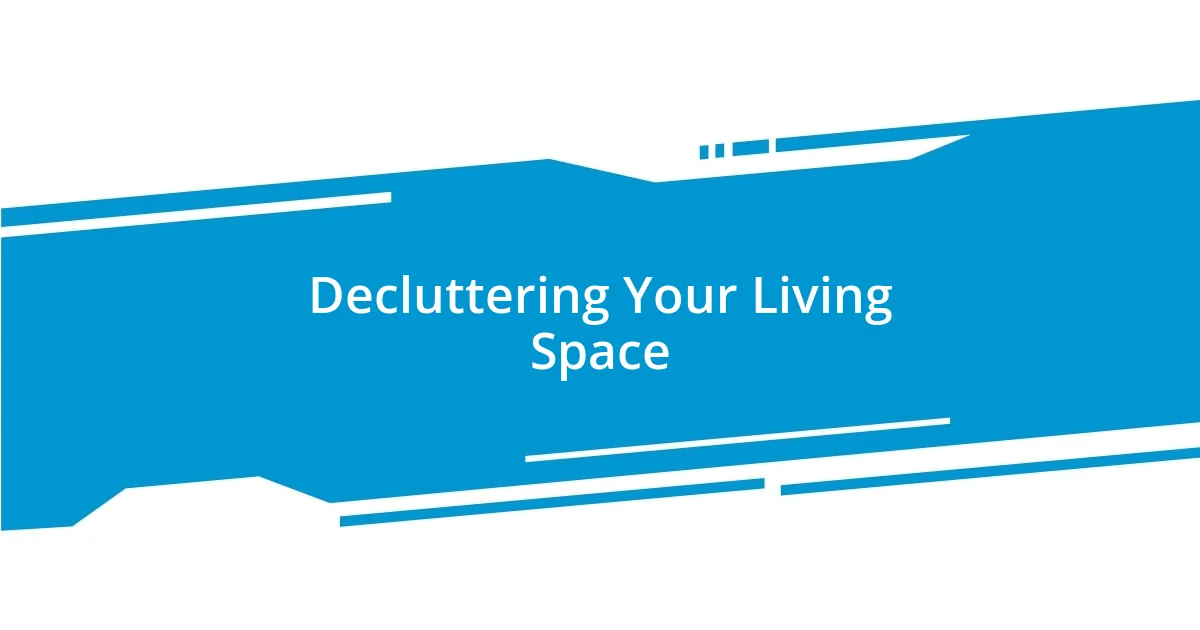
Decluttering Your Living Space
Decluttering your living space is an empowering journey. I recall spending an entire weekend sorting through boxes filled with items I hadn’t touched in years. Each item I let go of felt like shedding a layer of weight. It really hit me how much we hold onto things for the sake of nostalgia, don’t you think? That’s when I learned that memories live within us, not in objects.
When tackling my living space, I found it helpful to start small. One day, I decided to clear out my kitchen drawers. It was surprising to find duplicates of utensils I hardly used. Having a streamlined set not only made cooking more enjoyable but also made each utensil feel more meaningful. Who knew decluttering could amplify the joy of everyday activities?
In my experience, a systematic approach works wonders. I developed a simple rule: if I hadn’t used an item in the past year, it was time to reconsider its purpose in my life. This principle turned my cluttered spaces into areas that reflected my current lifestyle. Isn’t amazing how a few conscious choices can transform where we live?
| Before Decluttering | After Decluttering |
|---|---|
| Overwhelming clutter | Open and inviting space |
| Countless duplicates | Essential items only |
| Difficulty finding things | Everything has its place |
| Constant distraction | Increased focus |
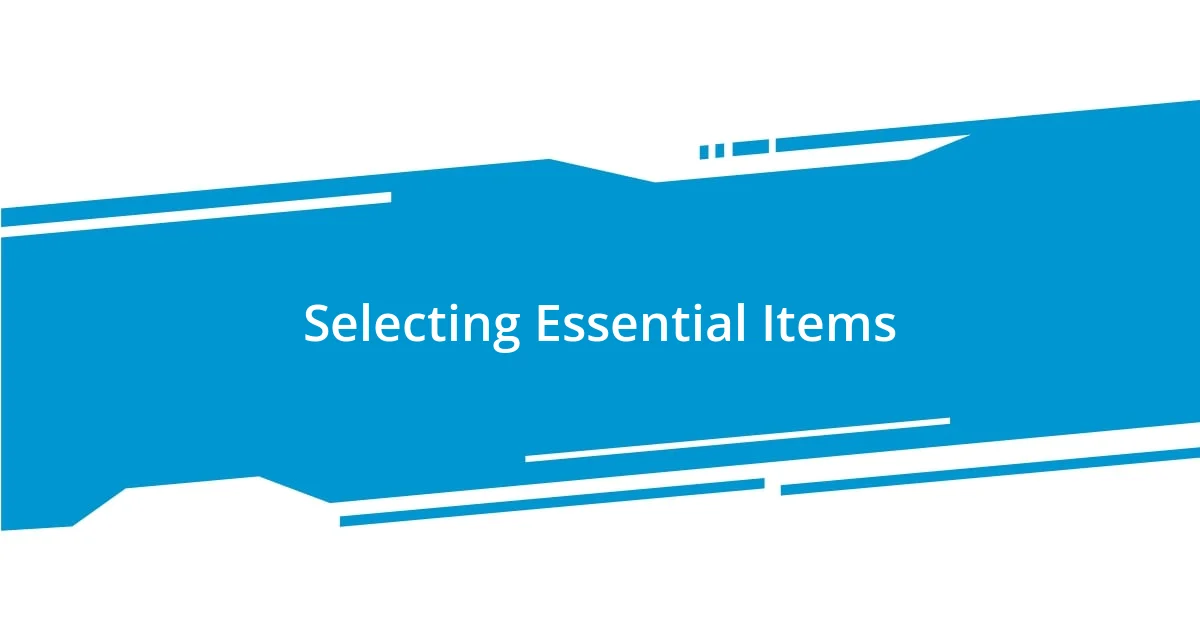
Selecting Essential Items
Selecting essential items for a minimalist living space is often easier said than done. I remember standing in my living room, looking at a pile of books I’d once cherished but never read. It dawned on me that keeping them was more about clinging to an ideal version of myself than actually valuing their presence. Have you ever found yourself holding onto items just because they represent who you wish you were, rather than who you are? It’s a powerful realization when you start to differentiate between necessity and nostalgia.
One approach that worked for me was to categorize items by their use. I would group kitchenware, clothing, and personal items, and then evaluate how each category enriched my life. Surprisingly, I discovered that some objects had simply become habitual fixtures—like that fancy serving platter gathering dust. I asked myself, “When was the last time I used this?” And once I did, the answer was often liberating; letting go of those pieces felt like gaining a new perspective on what truly matters.
Finally, I found it helpful to visualize my space as a canvas. Each item I decided to keep became a brushstroke in a larger picture. I remember when I displayed my favorite coffee mug on a shelf, instantly transforming my kitchen into a welcoming nook instead of a cluttered corner. This shift in mindset from accumulation to intention not only changed my space but also how I viewed my belongings. Doesn’t it feel wonderful to curate a space filled with items that spark joy and serve a purpose?
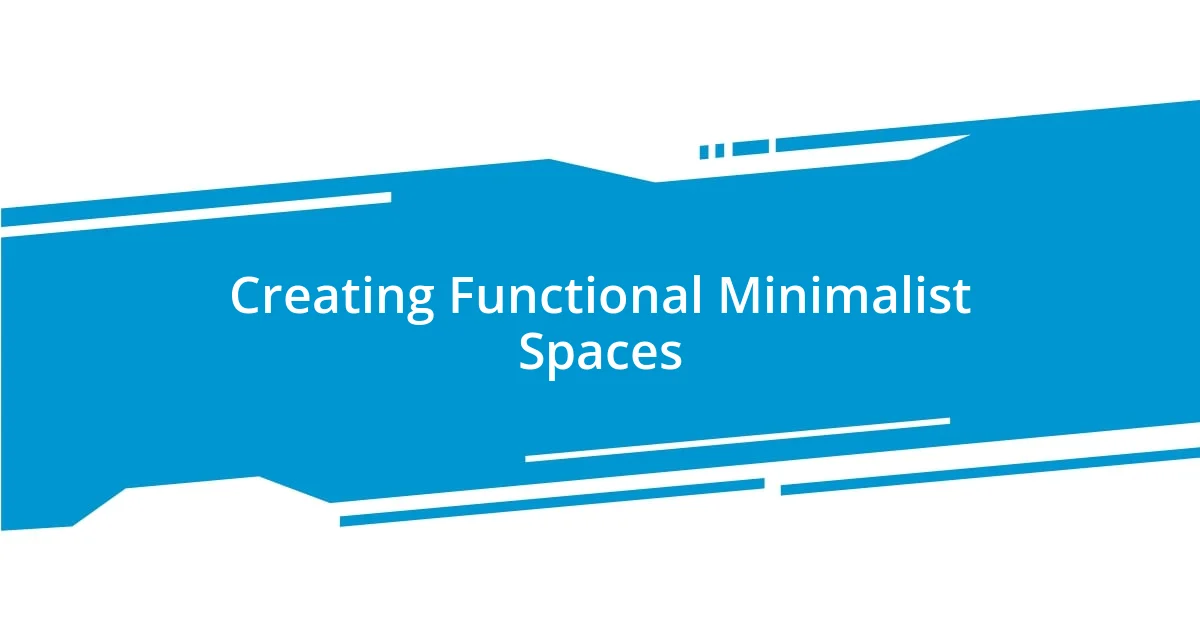
Creating Functional Minimalist Spaces
Creating functional minimalist spaces is about more than just decluttering; it’s about reshaping how we interact with our environment. I vividly remember rearranging my living area to focus on usability and flow. Instead of cramming furniture into every corner, I opted for a few key pieces that truly served a purpose. Have you noticed how much easier it is to relax in a room that invites you to unwind rather than one that overwhelms you with stuff?
One of my favorite strategies was integrating multifunctional furniture. I invested in a coffee table that doubles as a storage unit, which not only saved space but also kept my living area tidy. Initially, I was skeptical—would it look too bulky? But I was pleasantly surprised by how it brought an inviting atmosphere to the room. It made me realize that functional pieces can be beautiful and serve a purpose without sacrificing style.
In crafting these spaces, I also found it essential to consider natural light and layout. I remember transforming my workspace by moving my desk closer to the window. The boost in natural light drastically improved my productivity and mood. Do you think a well-lit space can enhance creativity? From my experience, it certainly does; letting in more light made my minimalist approach feel optimistic rather than barren. A visually appealing and thoughtfully designed space can significantly impact how we feel each day.
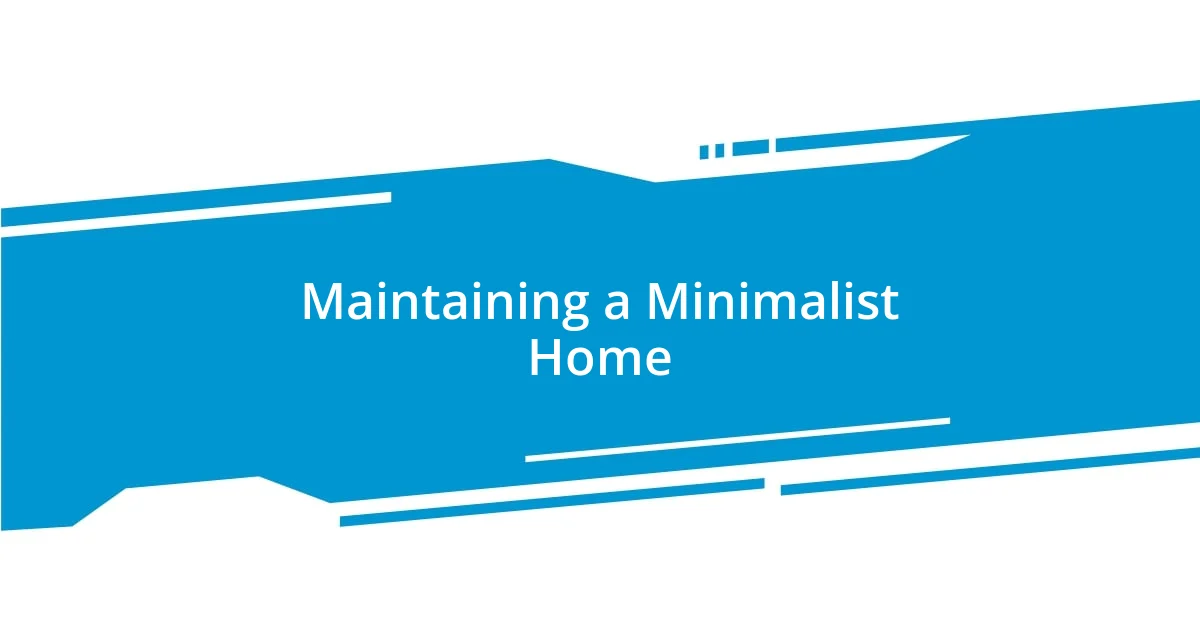
Maintaining a Minimalist Home
Maintaining a minimalist home is an ongoing journey that requires intention and consistency. I recall a time when I felt overwhelmed by a sudden influx of items after a family gathering. Instead of succumbing to clutter, I decided to establish a routine where I would reassess my belongings weekly. This habit helped me keep my environment aligned with my minimalist values, making it easier to enjoy my space without feeling burdened.
One key practice I’ve adopted is the “one in, one out” rule. For every new item I bring into my home, I let go of something else. I remember challenging myself after purchasing a new plant. I reluctantly parted with an old picture frame that no longer fit my aesthetic. Surprisingly, the process felt refreshing, as it not only kept my space tidy but also cultivated a sense of freedom from material attachment. Have you ever noticed how lightening your load can lift your spirits?
Creating a cleaning schedule is another cornerstone of my approach to maintaining a minimalist space. I found that dedicating just a few minutes each day to tidy up prevents clutter from accumulating. Recently, I set a timer for 10 minutes each evening, and it transformed my routine into a delightful habit. I often finish with a sense of accomplishment, knowing that my home reflects my desire for simplicity. How do you feel when your space is organized? It’s amazing how a tidy environment can inspire clarity and calm in everyday life.
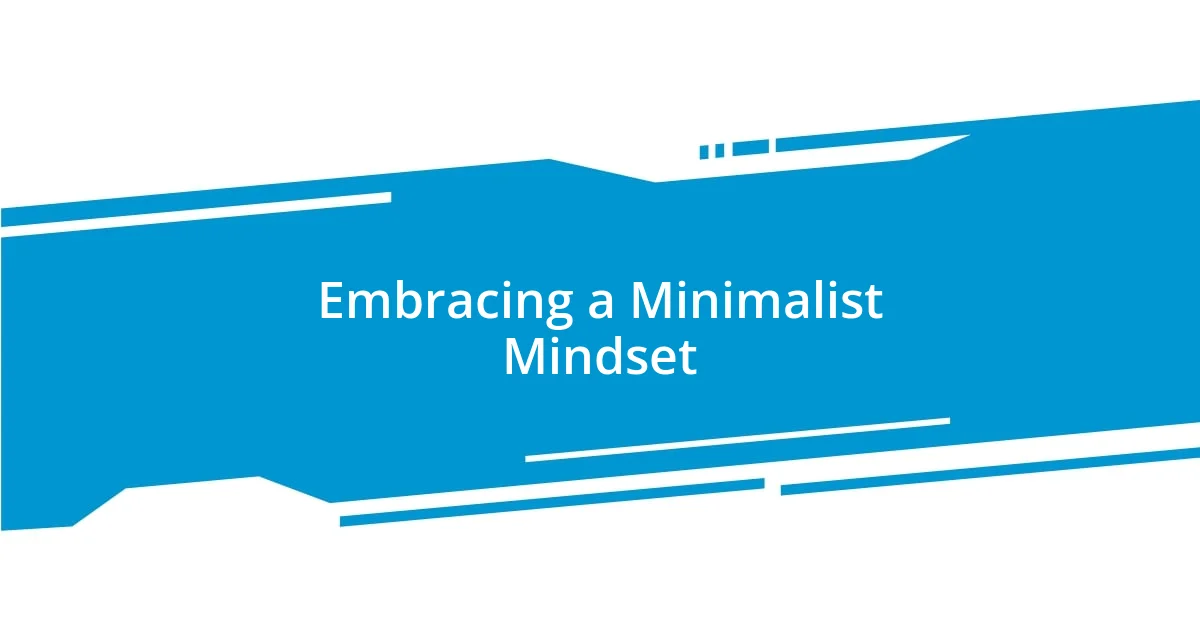
Embracing a Minimalist Mindset
Embracing a minimalist mindset isn’t just about having fewer things; it’s about a shift in perspective. I found myself questioning what truly adds value to my life. One day, while contemplating the myriad of knick-knacks scattered around my home, I realized many of them were mere spectators of my life rather than participants. Isn’t it liberating to think about how much more fulfilling life can be when we curate our surroundings intentionally?
Through this journey, I’ve also come to appreciate the emotional weight that possessions can carry. For instance, I once hesitated to part with a heavy collection of books I’d never read. However, when I finally donated them, I felt a sense of relief wash over me. It reinforced my belief that letting go of the unnecessary can open up space not just physically, but emotionally as well. Have you ever felt a rush of exhilaration after decluttering?
As I deepened my understanding of minimalism, I discovered the importance of mindfulness in my decision-making process. Each time I considered a new purchase, I’d ask myself if it aligned with my core values and contributed to my well-being. This internal dialogue has made shopping feel less like a chore and more like a conscious choice. Have you noticed how being selective with what you bring home can transform your space and life? For me, it definitely creates a refreshing sense of purpose in my daily activities.










